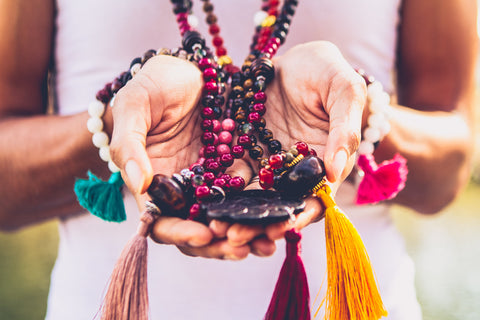Mala FAQs

Mala necklaces are more than just beautiful accessories to wear or carry with you. Malas are meditation tools that have been used for thousands of years. They encourage us to focus, breathe and connect with our deepest intentions. They motivate us to take a few moments out of our day to care for and love on our inner self.
Use your mala to set your intentions as a powerful way to manifest your dreams and personal goals.
A mala is a string of 108 beads (or 54, 27, 21) with a focus or Guru bead at the head.
Malas are used to count your mantras during meditation. Wearing your mala is a great way to wear your intentions all day as a constant reminder of the things you are working towards.
Why 108 beads?
There many explanations as to the reason for why 108 beads are used. Here are a few explanations for the use of 108 bead asthe standard number:
- 9 & 12: The numbers 9 & 12 are considered by many to be very sacred numbers, and 9 x 12 = 108.
- Earthly Desires: There are said to be 108 earthly desires in mortals.
- The Heart Chakra: The chakras are intersections of energy lines and there are said to be 108 energy lines converging to form the heart chakra.
- Time & Feelings: Some say that there are 108 feelings, with 36 being related to the past, 36 to the present, and 36 to the future.
- 8 Extra Beads: 100 mantra recitations are counted as completed, while the remaining 8 are there to give room for errors & omissions. The 8 are also said to be an offering to God or Guru.
- The Numbers Themselves: The numbers 1, 0, and 8 also have their own specific meanings. 1 for God or Higher Truth, 0 for emptiness or completeness in spiritual practice, and 8 for infinity or eternity.
Malas are traditionally held in your right hand and used in two ways
1- Your mala hangs between the thumb and the ring finger. The second finger is used to advance your mala by one bead toward oneself with each repetition of breath or mantra.
2- Your mala hangs on the middle finger, with the thumb used to advance your mala just as explained; one bead at a time.
I create my malas so that they begin and end with a small hematite bead. Hematite is a ground stone. This is meant to remind you to focus on your intentions and release all the clutter going on around with before you begin your meditation.
No matter which way you choose to hold your mala during meditation, the index finger is never used to touch the mala. (The index finger represents ego, seen as the greatest impediment to self-realization in ancient Hinduism).
Spacer beads (usually after every 18th and 36th bead) are meant as way to mark your place and re-focus your mind as it starts to wander. Spacer beads are not usually counted as a mantra bead. To be sure, count your beads before you begin using your mala so that you know you are counting correctly.
Your meditation practice begins at the first bead just behind the guru bead (or the biggest bead above the tassel) and continues around the loop until your reach the guru bead again. Never touching or crossing over the guru bead.
If you'd like to continue your practice when you reach the guru bead, reverse the mala and continue in the opposite direction.
How do I choose my personal mantra?
Every mala I make comes with a suggested mantra to help you get started, but your mantra is personal to what you need and how you want to feel.
There are many traditional mantras you can use during your meditation, each have their own specific meaning and intention. “Om” is the most popular of them all.
I, however, have always found that reciting a modern mantra (in English) helps me to focus on and really absorb the intention that I am setting for myself that day, week, or month.
Once you choose your mantra- the word, phrase, or invocation- chant it in a way that works for you: loudly, softly, or even internally. Shorter mantras are the easiest to chant with your mala and should be chanted 108 times.
But don't worry, this is your meditation time. You can chant it 108 times or less or more...as many times as you like.
What if my mala breaks?
If it happens, it will take quite some time for your mala to break.
The history and tradition of mala beads views the breaking of a mala as a positive thing. It symbolizes a breakthrough in your practice, a sign of progression. If your mala breaks, recall the breakthroughs you've experienced during the time you've been meditiating. This may be a sign that the intention you have been focusing on has come to fruition and it is is the perfect time to set a new one.
Malas can be re-strung if you so desire, and blessed all over again with a new intention set to them. I will happily re-string your mala for you.

